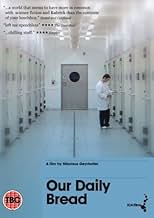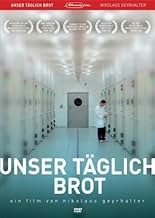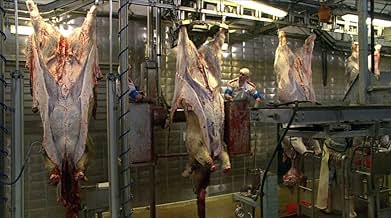IMDb रेटिंग
7.5/10
2.7 हज़ार
आपकी रेटिंग
अपनी भाषा में प्लॉट जोड़ेंOUR DAILY BREAD is a wide-screen tableau of a feast which isn't always easy to digest - and in which we all take part. A pure, meticulous and high-end film experience that enables the audien... सभी पढ़ेंOUR DAILY BREAD is a wide-screen tableau of a feast which isn't always easy to digest - and in which we all take part. A pure, meticulous and high-end film experience that enables the audience to form their own ideas.OUR DAILY BREAD is a wide-screen tableau of a feast which isn't always easy to digest - and in which we all take part. A pure, meticulous and high-end film experience that enables the audience to form their own ideas.
- निर्देशक
- लेखक
- स्टार
- पुरस्कार
- 4 जीत और कुल 5 नामांकन
फ़ीचर्ड समीक्षाएं
In contrast to the well-meaning but didactic and dry FOOD INC., this documentary explores the process of mass food production without preaching or judgment. Because it is entirely wordless (well, not entirely... we hear some of the workers chatting, but since it's left untranslated, I assume it's the inconsequential small talk it appears to be). While this might make it less informative, the images speak volumes about how cold and impersonal the process is. Machines invented for extremely specific animal-rendering tasks (the "chicken vacuum" is a total mindf*ck), people performing repetitive and methodical jobs, massive facilities crammed with rigidly parceled animals. The cinematography is superb, with framing that is Kubrickian in its sense of scale, depth and symmetry. The film is hypnotic and meditative, giving the viewer room to form his own opinions, to wander down different avenues of thought regarding how we produce and consume food. Geyrhalter is careful not to dehumanize the workers, no matter how inhuman the process is. We often see them hanging out, or enjoying their own meals. Don't hate the playa, hate the game. And one doesn't get the sense is Geyrhalter is merely finger-wagging. Although there are brutally disturbing images (maybe worse than any other slaughterhouse footage I've seen), there is almost an admiration for how efficient these routines are. But again, any conclusions you draw are your own. Will I change my consumption habits? Knowing me, probably not, but it certainly got me thinking about it.
I'm always a sucker for films that try to emulate Baraka or Koyaanisqatsi. Non narrative films that let the images speak for themselves. A lot of films try and fail. Sometimes the images are too boring, sometimes it's too repetitive. 'Our Daily Bread' just about nearly gets it right by exploring how the food on our table comes to be. By going all over the world, and exploring all sorts of food, the filmmakers cover a spectacular realm of food, animals, and people for the documentary. Much is spectacular. What I found, and maybe I'm just a sicko, who knows, but I found the segments regarding how animals are processed to be the most fascinating. They almost completely copied the chick harvesting from Baraka (and who could blame them!) to the, I'm sorry, totally cool way they kill pigs nowadays. FUN FOR EVERYONE! Ha ha! I loved it!
The movie is a stunning visual documentary of modern day food production. There is no dialog - just visuals (with sound).
The video is taken from food production facilities in Europe. With the growth of the worldwide population, it is fascinating to see how streamlined (and a bit "freaky") food production has become. It's almost like watching factory assembly lines punching out one "widget" after another.
Sometimes it's disturbing to watch because the "widgets" are live animals or carcasses. These scenes made me really think about population expansion - it's very unsettling to think about how much this type of food production will have to be escalated to feed the growing masses.
If you are intrigued by mass production processes of basic vegetable and meat food supplies, this is a great film to see. It's a visual diary of the processes involved.
The video is taken from food production facilities in Europe. With the growth of the worldwide population, it is fascinating to see how streamlined (and a bit "freaky") food production has become. It's almost like watching factory assembly lines punching out one "widget" after another.
Sometimes it's disturbing to watch because the "widgets" are live animals or carcasses. These scenes made me really think about population expansion - it's very unsettling to think about how much this type of food production will have to be escalated to feed the growing masses.
If you are intrigued by mass production processes of basic vegetable and meat food supplies, this is a great film to see. It's a visual diary of the processes involved.
The quality of the this film, how it focuses on the various aspects of large and highly advanced agricultural processes used in Europe is very interesting and seems to include a great amount of detail in the various processes that result in the meat and vegetables that are destined to show up on people's dinner tables. From feeding beef cattle to harvesting Irish potatoes we get fine quality shots that include so much information both close-up and deep shots. Most of us are so distanced from how our food is produced. Most producers I would imagine don't really want to let us in on what goes on before the products shows up in our market showcase. The candidness of the images that show the operations where the food is grown and processed is great. I bet that few food producers in the U.S would allow such filming in the establishments
Don't watch this movie if you have bad stomach or you won't be able to eat for a while. It shows quite a bit of shocking footage of modern food processing facilities. Dehumanization of food processing is well shown by creative camera placement. Camera placement resembles Kubrick's in some scenes - scenes of machines and people moving through corridors. Some of machines and procedures shown in the movie are really shocking. Movie doesn't have any narration, only sounds that you hear are sounds of the environment. A bit of well picked music would make this movie even better. If you want to know how the food you eat comes to your table this is the movie to watch.
क्या आपको पता है
- कनेक्शनReferenced in Film Junk Podcast: Episode 232: Inglourious Basterds (2009)
टॉप पसंद
रेटिंग देने के लिए साइन-इन करें और वैयक्तिकृत सुझावों के लिए वॉचलिस्ट करें
विवरण
बॉक्स ऑफ़िस
- दुनिया भर में सकल
- $71,810
- चलने की अवधि1 घंटा 32 मिनट
- रंग
- ध्वनि मिश्रण
- पक्ष अनुपात
- 1.85 : 1
इस पेज में योगदान दें
किसी बदलाव का सुझाव दें या अनुपलब्ध कॉन्टेंट जोड़ें





















